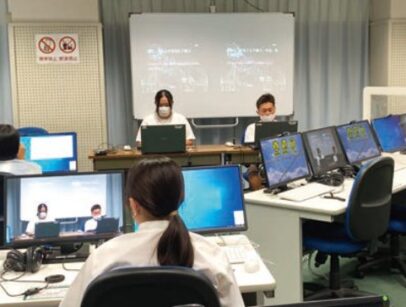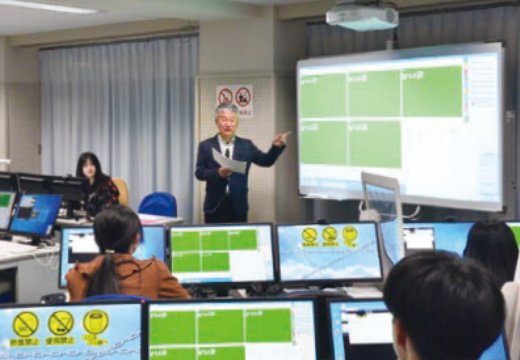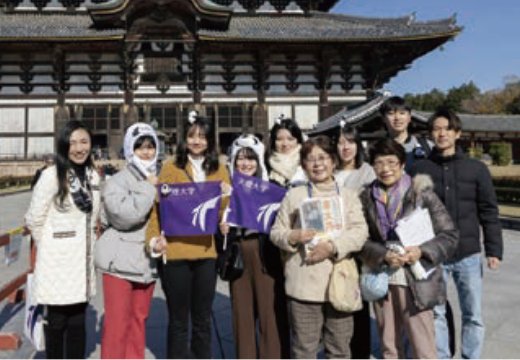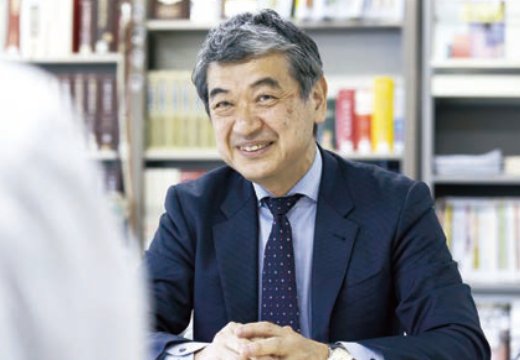Faculty of International Studies Department of Chinese Studies Contributing to a multicultural society in Chinese
English translation in progress. Thank you for waiting.
Contents
Department Overview
This Department is suitable for the following people:
- Those who want to master Chinese to the fullest
- Those who are interested in Taiwan
- Those who want to make an impact globally.
Learning Key Points
01. Efficient and enjoyable learning with ICT (Information and Communication Technology)
By integrating the latest ICT with a unique method guided by native Chinese instructors, students can acquire pronunciation, listening, and typing skills in a fun and efficient way. As a result, many of our students have won awards in Chinese speech contests.

02. The best university to study about Taiwan in Japan
Subjects related to Taiwan are well-developed. It is a rare program where you can learn 'Taiwanese Mandarin' and 'Taiwanese Hokkien' from exchange professors at Chinese Culture University, which is a partner institution in Taiwan. Opportunities for studying abroad at National Taiwan University, National Taiwan Normal University, and Chinese Culture University are also available.

03. Community contribution through Chinese-speaking volunteer activities
Students actively plan and carry out volunteer activities such as participating in international festivals, reading Chinese picture books aloud, and providing translation services for inbound visitors. These experiences not only help students develop advanced language skills but also foster a strong sense of social responsibility and the ability to contribute to the local community.

Enrollment models and qualification models to make the most of your learning for the future
"International Contribution Oriented" enrollment model
This enrollment model is for those who aim to work globally, such as working for private companies engaged in overseas expansion such as trading companies, foreign-affiliated companies, local enterprises, NGO/NPO staff, Japanese language teachers, and overseas missionaries.
- Future vision: working at a foreign company, staff member of an NPO/NGO, etc.
"Regional Contribution Oriented" enrollment model
This enrollment model is designed for those aiming to become high school teachers (Chinese), work for public organizations, government agencies, or private companies in Japan. It is intended for students who wish to deepen their understanding of international perspectives and multicultural coexistence, and who are motivated to contribute to solving issues in local communities.
- Future vision: high school teacher (Chinese), government employee, etc.
"Glocal Oriented" enrollment model
This enrollment model is intended for students aiming to work at foreign-affiliated companies in Japan, international organizations, pursue graduate studies, or join a variety of private-sector firms. It is designed for those who seek to address both global and local issues and are committed to finding practical solutions.
- Future vision: working at an international organization, pursuing graduate studies, etc.
Four-year learning process
First-year
続きを読むAcquire basic Chinese language skills and introductory knowledge of the Chinese-speaking world
Through required Chinese language subjects and taking the class "Introduction to the Study of Chinese Speaking Countries," students will develop basic communication skills in Chinese and gain introductory knowledge about the Chinese-speaking world.
Representative Classes
 ・Chinese A, B (Listening)
・Chinese A, B (Listening)
Using the "Analyzer" function of the CALL (Computer Assisted Language Learning) system, students will learn essential listening skills for everyday conversation in a fun, game-like environment, while also building their abilities step by step in an efficient manner.
Second-year
続きを読むCultivate strong Chinese language skills and multicultural awareness
Students will strengthen their Chinese language skills through speech classes and volunteer activities, while deepening their understanding of multicultural society through language training in Taiwan.
Representative Classes
 ・Volunteer Work in Chinese A, B
・Volunteer Work in Chinese A, B
Based on an understanding of the role of Chinese speakers in Japan, we plan and design social contribution activities using the Chinese language and collaborate with relevant organizations in Nara Prefecture to implement them.
Third-year
続きを読むAcquire practical Chinese and logical thinking skills
Students will acquire practical Chinese language skills through study abroad programs and volunteer activities. In seminars, they will develop logical thinking skills while learning techniques and knowledge necessary for writing their graduation thesis.
Representative Classes
 ・Business Chinese
・Business Chinese
Following the basic flow from the start of negotiations to closing, students will learn essential Chinese business vocabulary and expressions, gain market knowledge, and acquire well-rounded business communication skills.
Fourth-year
続きを読むFind a topic that interests you and start working on your thesis
【Examples of graduation thesis themes】
- A Consolidation Period of Democracy and Civil Society in Taiwan
台湾における民主主義の定着時期と市民社会 - A Study on the Factors Behind the Expansion of Coffee Consumption in Taiwan
台湾におけるコーヒー消費の拡大要因に関する一考察 - A Study on Women's Traditional Costumes Among Ethnic Minorities in China
中国少数民族における女性衣装に関する考察 - A Comparison of the Chinese and Japanese Titles of Kung Fu Films
カンフー映画の日中タイトルに関する一考察 - The Formation and Transformation of the "Giant Panda" Image in Japan
日本における「パンダ」イメージの形成と変化
- A Consolidation Period of Democracy and Civil Society in Taiwan
Employment Results and Qualifications
100%
Actual employment results for the Department of Chinese Studies, Faculty of International Studies in March 2025
Major employers (information for the most recent 5 years)
Kakimoto Co., Ltd., Kyowa Co., Ltd., Patlite Corporation, Kintetsu Railway Co., Ltd., Tokyo/ Nihon Kotsu Co., Ltd., Air China Ltd., Doutor Coffee Co., Ltd., Daimaru Enawin Co., Ltd., Tsubakimoto Machinery Co., Osaka/ Sujata Meiraku Group, Japan Food Co., Ltd., 10Fields Factory Inc., maruichi Cutting Tools Co., Ltd., tutuanna Co., Ltd., Bishop Inc., First Group Co., Ltd., Paris Miki Holdings Inc., Ltd., Kusuri no Aoki Holdings Co., Ltd., Student Information Center, Nikken Corporation, Yamashita Ltd., Nippon Restaurant System Inc., Shirahama Key Terrace Hotel Seamore, Hotel New Awaji Group, Tenri Hospital, JA Naraken, Police Department (Nara Prefecture, Kochi Prefecture), etc. (listed in no particular order)
Available Qualifications
- First Class High School Teaching License in Chinese
- Qualification for appointment as a social welfare administrator
- Librarian
- Museum curator
- Japanese language teacher
- Corrections and Rehabilitation
- Missionary of the Tenrikyo church
Faculty list
Curriculum
Curriculum tree(PDF)
Curriculum map(PDF)
Education Policy
Admission Policy
In order to fulfill the educational goals of the Department of Chinese Studies, we seek for students with the following qualities:
1. (International awareness) Those who have an interest in “international awareness,” which is Tenri University’s educational policy.
2. (Knowledge, Skills) Those who are interested in communicating in Chinese.
3. (Knowledge, Skills) Those who are interested in the diverse culture of overseas Chinese communities.
4. (Knowledge, Skills) Those who can identify issues independently and take action to solve them.
5. (Attitude) Those who are interested in multicultural coexistence.
6. (Action) Those who can take action based on the “spirit of selfless service.”
7. (Motivation) Those who have had experience in actively engaging in social activities and extra-
curricular activities and are interested in the Chinese language.Entrance examination methods will take various forms, such as comprehensive selection, special
selection, school recommended selection, general selection, and transfer selection.Curriculum Policy
We systematically distribute subjects that give students the opportunity to pursue specialized fields with the Chinese language as the foundation, such as language, literature, history, society, etc.
The curriculum is organized so that during the first year, the subjects are “Introductory,” in the
second year, “Basic,” and in the third year, “Applied.” The subjects will allow students to progressively acquire knowledge on Chinese communication skills, reading and writing, information gathering and analyzing. Further, the curriculum is organized so that students can take seminars that cover the overall studies, which will prepare them for the graduation research project and to write their graduation thesis.
Also, for the purpose of improving language skills, and to experience life abroad, students are required to participate in a three-week language training program in Taiwan during their second year.Diploma Policy
A bachelor’s degree (Chinese Studies) will be awarded to students who have acquired the following knowledge and abilities:
1. (International awareness) Those who have acquired “international awareness,” which is Tenri
University’s educational policy.
2. (Knowledge, Skills) Those who have acquired communication skills in practical Chinese.
3. (Knowledge, Skills) Those who have acquired basic knowledge of the diverse cultures within Chinese communities.
4. (Knowledge, Skills) Those who can identify issues independently and gather and analyze information in order to solve them.
5. (Attitude) Those who can engage in multicultural coexistence.
6. (Action) Those who can take action based on the “spirit of selfless service.”

 ・Chinese A, B (Listening)
・Chinese A, B (Listening) ・Volunteer Work in Chinese A, B
・Volunteer Work in Chinese A, B ・Business Chinese
・Business Chinese